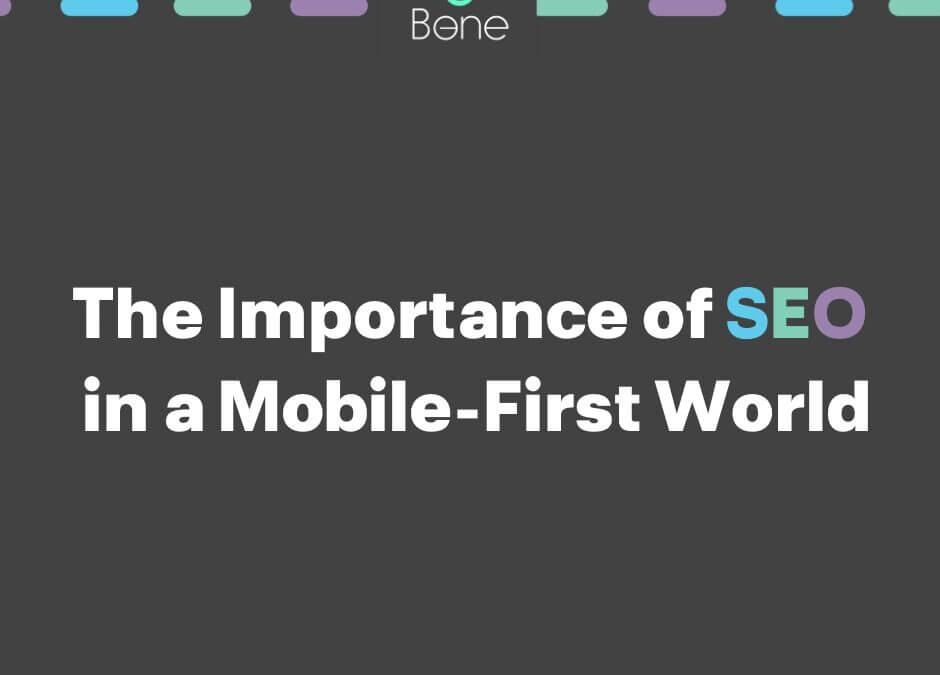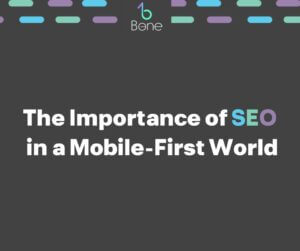In today’s digital landscape, where mobile devices dominate the market and drive a significant portion of internet traffic, search engine optimization (SEO) has become increasingly important, particularly in a mobile-first world. With more and more people relying on their smartphones and tablets to access information, conduct searches, and make purchasing decisions, businesses need to prioritize mobile optimization and adapt their SEO strategies accordingly. This article discusses the importance of SEO in a mobile-first world and why it is crucial for businesses to optimize their online presence for mobile devices.
Mobile-First Indexing: In 2018, Google introduced mobile-first indexing, which means that the search engine primarily uses the mobile version of a website for indexing and ranking purposes. This shift was made because the majority of Google’s users now access the internet through mobile devices. If your website is not mobile-friendly or lacks optimization for mobile, it may experience lower search rankings, reduced visibility, and ultimately, decreased organic traffic.
User Experience (UX): Mobile optimization goes hand in hand with providing a positive user experience. Mobile users have specific needs and expectations, such as fast loading times, easy navigation, and responsive design. If your website fails to meet these criteria, visitors are more likely to leave quickly, leading to high bounce rates and a negative impact on your SEO. On the other hand, a well-optimized mobile site enhances user experience, encourages longer visit durations, and improves engagement metrics, signaling to search engines that your website is valuable and relevant.
Local Searches: Mobile devices play a crucial role in local searches. Many people use their smartphones to find nearby businesses, services, or products. In fact, a significant number of mobile searches have local intent, such as “restaurants near me” or “plumbers in [city].” Optimizing your website for local SEO and ensuring your business information is accurate and up-to-date can significantly boost your visibility in local search results, leading to increased foot traffic and conversions.
Voice Search: With the rise of virtual assistants and smart speakers, voice search has become increasingly prevalent. People are using voice commands to search for information, make inquiries, and interact with devices. Voice searches are typically longer and more conversational than typed queries, making long-tail keywords and natural language optimization critical for SEO success. Optimizing your content for voice search queries can help you capture more organic traffic and stay ahead of the competition.
Mobile-Friendly Content: In a mobile-first world, creating mobile-friendly content is paramount. This means designing content that is easy to read and digest on smaller screens, using shorter paragraphs, bullet points, and concise sentences. Mobile users tend to scan content rather than reading it thoroughly, so organizing information in a clear and structured manner is crucial. By optimizing your content for mobile consumption, you can improve engagement, reduce bounce rates, and increase the likelihood of social sharing, all of which positively impact your SEO.
Social Media and Mobile Integration: Social media platforms are predominantly accessed through mobile devices, and they play a significant role in driving traffic and engagement. Sharing mobile-optimized content on social media channels increases the chances of users consuming and sharing your content, thereby increasing its reach and potential to generate backlinks, social signals, and overall visibility.
In conclusion, in a mobile-first world, SEO is essential for businesses to thrive in the digital space. Mobile optimization not only improves search rankings and organic traffic but also enhances user experience, caters to local searches, taps into voice search trends, and leverages the power of social media. By prioritizing mobile optimization and keeping up with the ever-evolving mobile landscape, businesses can stay competitive and effectively reach their target audience.
Mobile optimization is crucial in SEO because of the growing dominance of mobile devices in online search and browsing. To ensure your website ranks well in search results and delivers an optimal user experience, consider the following tips for creating mobile-friendly websites, optimizing for voice search, improving site speed, and leveraging mobile-specific features:
- Responsive Web Design: Implement a responsive web design that automatically adjusts the layout and content of your website to fit different screen sizes and orientations. This ensures that your website looks and functions well on both desktop and mobile devices.
- Mobile-Friendly Navigation: Simplify your website’s navigation for mobile users by using clear and concise menus, collapsible sections, and easy-to-tap buttons. Avoid using large drop-down menus that may be difficult to navigate on smaller screens.
- Optimize Page Speed: Mobile users expect fast-loading websites. Optimize your website’s performance by compressing images, minifying CSS and JavaScript files, and leveraging browser caching. Consider using tools like Google PageSpeed Insights to identify areas for improvement.
- Voice Search Optimization: As voice search continues to rise in popularity, optimize your content for voice queries. Focus on long-tail keywords and conversational language. Answer commonly asked questions related to your industry or niche. Also, consider incorporating structured data markup to help search engines understand and present your content in voice search results.
- Mobile-Specific Keywords: Understand the differences in user intent between mobile and desktop searches. Mobile searches often have local intent or are related to immediate needs. Incorporate mobile-specific keywords that reflect these user behaviors. For example, include phrases like “near me,” “on the go,” or “open now.”
- Accelerated Mobile Pages (AMP): Consider implementing AMP, a technology that creates lightweight and fast-loading versions of your web pages specifically for mobile devices. AMP pages are prioritized by Google in mobile search results and can significantly improve your website’s performance.
- Mobile-Specific Features: Take advantage of mobile-specific features to enhance the user experience. For example, leverage touch-friendly gestures like swipe, pinch-to-zoom, or tap-to-call functionality for phone numbers. Implement mobile-friendly forms and ensure that contact forms or checkout processes are easy to complete on a mobile device.
- Local SEO: Optimize your website for local search by including your business address, phone number, and operating hours. Create a Google My Business profile and ensure your business information is accurate and consistent across online directories and local listings.
- User-Testing and Feedback: Regularly test your website on various mobile devices and gather feedback from users. Conduct usability tests to identify any issues or areas for improvement. Pay attention to factors such as readability, button sizes, and overall user experience.
- Mobile-Social Integration: Incorporate social sharing buttons and optimize your content for mobile-friendly sharing. Mobile users are more likely to engage with and share content on social media platforms, which can enhance your website’s visibility and organic reach.
By implementing these tips and continuously monitoring and adapting to changes in mobile user behavior, you can optimize your website for mobile devices, improve your search rankings, and provide a seamless user experience for mobile visitors.
marketing agency in cairo







